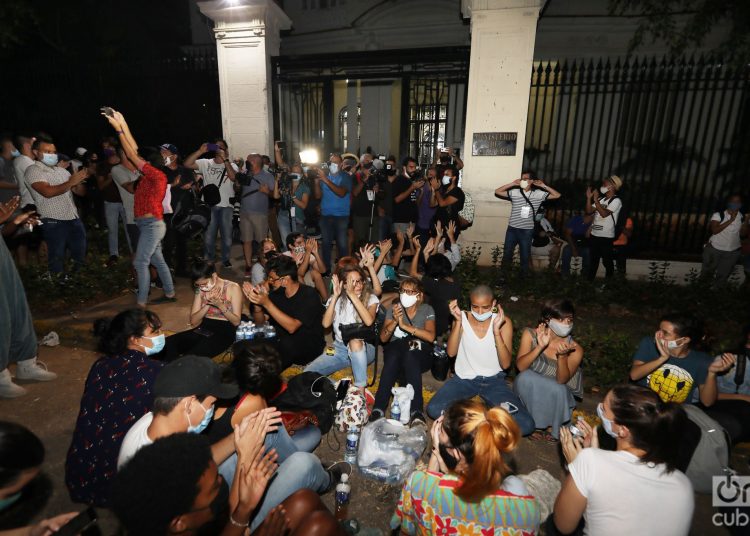Yesterday, November 27, was a normal day and a long night.
Every day is more or less the same for me. Or work, or work. It started at 7 am with an event through zoom, VPN willing, with the German Max Planck Institute, with that bad habit that people have of not speaking Spanish all the time. Then a kilometric online meeting. Later, more work. Then the line at a store which I had promised my mother. Meanwhile, I didn’t stop looking at the phone to see what was happening at 2, between 11 and 13. I calmly let the need to go there grow inside me. I walk and talk fast, but I prefer to think slowly.
The night would be something else. I took some bread and two bottles of water to give out and went to the Ministry of Culture. When I arrived, I didn’t feel anything different from what I feel when I go to a concert. You know four out of every five people, whether in person or virtually (Havana has always seemed to me a city as beautiful as it is small). I talked to a lot of friends about the same old things. Some laughed at the last post, the “old guys” asked about our children, then we met the children there, and the children’s friends, another applied hand gel and offered the small container, another offered coffee even with plastic cups, I laughed reading Dimitri Prieto saying that we were there following Marx’s eleventh thesis on Feuerbach, and so on. All quiet.
Meanwhile, 32 people were inside the MINCULT meeting with Deputy Minister Fernando Rojas Gutiérrez, in one of those meetings that will be cited forever. Such a meeting, in an official institution, in front of its authorities, with people of such diversity, has not taken place in Cuba since the early 1960s.
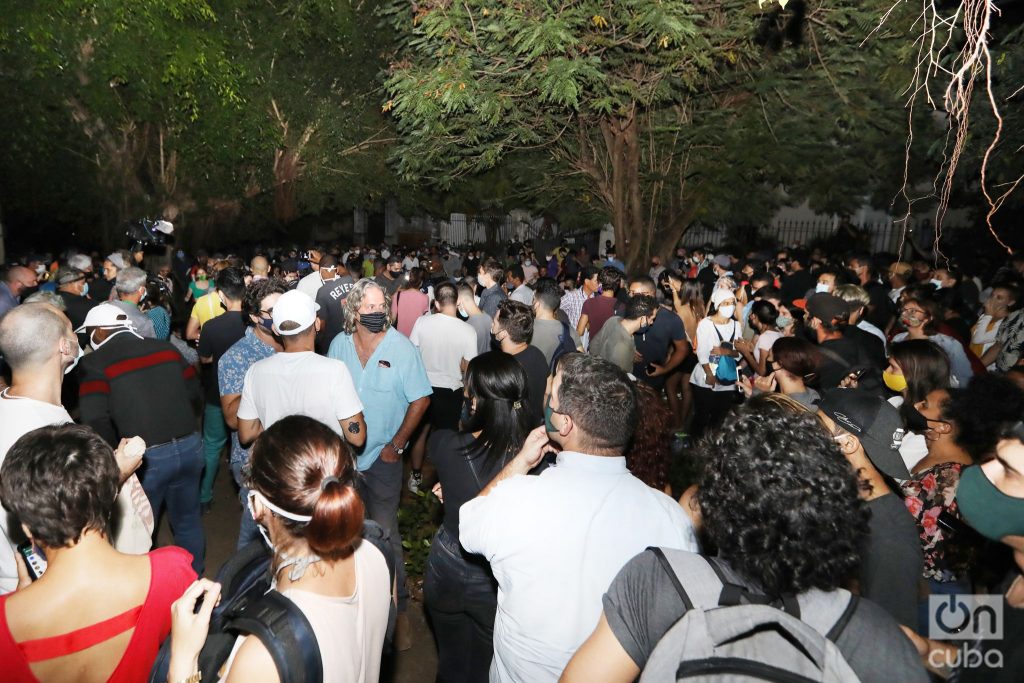
***
I was looking at the phone obsessed with saving the battery’s life. Friends texting, offering recharges. Cirenaica Moreira, my favorite photographer, the greatest in Cuba in my modest opinion, celebrated my photos, and I had the nerve to ask her for a few words for a hypothetical future exhibition. Everyone was talking about the thing, about how Facebook had not worked the day before. Another friend sent me, of her own free will, an English translation of the post I wrote before leaving for the Ministry. Everything is normal. Many messages told me “take care,” but I didn’t really give them much importance.
By that time, this was literally a concert. Fito del Río, a singer-songwriter friend of my children, was singing his own songs. A poet I met a few days ago at a presentation of El Caimán Barbudo, performed the same verses he said then.
Time was passing. Then the songs became songs of my lifetime. Santiago Feliú, Frank Delgado, Carlos Varela, X Alfonso, Teresita Fernández and, obviously, Silvio and Pablo. But the power went out.
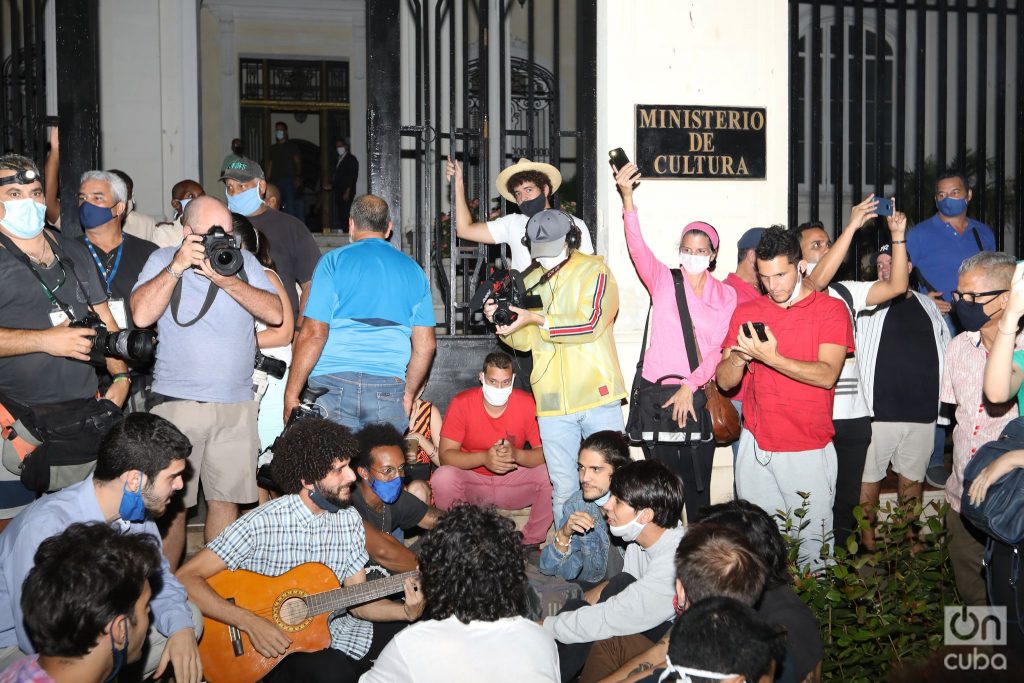
***
That’s when “Cuando se vaya la luz mi negra” began. I was transported to the rooftop of Habana Blues and to that group of unbeatable Cubans that the Benito Zambrano film portrays so well. Shortly before, Yailene Sierra had written to me on Facebook to see if it was possible to enter the Ministry area. Yailene, like Broselinda or Laura de la Uz, is one of those actresses that you remember everything about. I remembered Yailene’s gaze directed at her damn ex-boyfriend—there are people who try hard, but they’re still complete bastards—on the rooftop of that movie while they sing in chorus Cuando se vaya la luz mi negra.
But we’re still without electricity on a dark night, on a street with lush trees. It was impossible to see anything, only a few meters away. Then we see a lot of lights advancing towards us. It was, honestly, kind of terrifying. I had seen many police officers and soldiers in plain clothes arriving, and many organized civilians, on their buses and wearing t-shirts, and news circulated about the arrival of new groups of them in the vicinity.
For a few seconds, as the lights moved towards us, some possibilities flashed through my mind very quickly. Among them, I thought that they came to charge against us as in the 1930s—I remembered in a flash that Enrique José Varona also lived in Vedado—a fact that I know by heart from the chronicles of Raúl Roa and Pablo de la Torriente. It was weird, because I knew that that was not going to happen; however, it was what was in my mind for the longest time during those few seconds. I decided to stand up and face the lights, which turned out to be cell phones.
They were young people, about 50 of them, who had broken, with their hands raised as they later said, the police cordon that at that time prevented access to the Ministry. When we saw that it was those young people, everyone applauded. I saw, almost literally, how one of the layers of pressure that floated in the environment decreased.
(Just in case, I should have clarified before that I am only narrating what I saw. I’m not completing my memories with what others told me or with what I read on Facebook. I can make a mistake in the chronology of the events, which also happens to me often, but not in what I saw.)
After a while, a young man shouts “For the record, we were fifty defenseless young people and they tear-gassed us.” In that instant, I neither understood nor believed him. I thought he was a provocateur. I’ve been, outside of Cuba, in several demonstrations and my idea of “tear gas” is vehicles spreading gases and seeing people literally unable to breathe. Then another young man, visibly upset, and I think crying, yells: “They tear-gassed us.”
The social sciences repeat this ad infinitum, but it’s extraordinary to see the wisdom that collective action develops in action in a few seconds and in scenarios to which it is not used. All attempts at provocation, or to insist on questions that were true but “if insisted on” could complicate the entire presence there, received immediate responses from any participant.
For example, it was true that on one or more occasions, they were not letting in people who wanted to get to the Ministry. Several of the participants began shouting “let them in.” Maybe it wasn’t provocation—I didn’t even see who yelled it—but it could lead to it. In a second, an art critic, who uses Castilian in a refined way when writing, blurted out in Cuban Spanish: “Well, nothing happens, let them sit there and that’s it.” It was acclaimed.
That wisdom worked just as well when that second young man, so affected, screamed that they had been gassed. Others approached him, talked to him closely, offered him a seat on the floor. That intent on provocation did not grow, nor did any response to that fact escalate. Nothing was shouted there. Not a slogan. Nothing. Music and applause, which sounds like the name of a ridiculous TV show, was the only thing I heard there.
Meanwhile, I saw the fear directly. A girl looked around with a tremor and said, “I’m getting text messages saying that military in plain clothes are entering.” At that time, I was next to Mario Castillo, an old friend, an Alfredo López type of anarchist, who is as calm as the Chinese he has studied so well. He told her, “calm down, they have been here from the beginning, nothing happens, it’s their job: that of the insecurity of the state.” After a while, he also said: “look what a beautiful moon.”1
In case you haven’t noticed, I am intellectually quite nerdy. There is no phrase I hear that I don’t associate with another. I remembered poet and professor Guillermo Rodríguez Rivera saying that the “Padilla Case” was a problem of “state insecurity.” Also, at some point during the blackout, I realized that it was November 27 and I got to thinking—that happens in just seconds—of Mateo Orozco, the completely unknown Cuban hero who killed Gonzalo Castañón, to become the beginning of the saga that led to the execution of the eight medical students in 1871.
The association was not fortuitous, Mario had told me shortly before that in the morning they had been paying homage to the students, to the black Abakuás murdered in those days in defense of the students, and to Tato Quiñones.
“Absorbed in such deep thoughts,” I am approached by Royma Cañas, a friend and editor, with whom I worked for several years at the Social Sciences Publishing House. She tells me “Guanche: they gassed me.”2 Nearby, I hear other people talking about the same thing. One shows his eyes, very red. I ask Royma to explain. She is slim and petite, weighing less than half my weight. There was a strange mix of calm with fury in her voice. She and others had gone out to find something outside the block where the Ministry is located. Upon returning, they were prevented from re-entering.
They asked why and were answered with “they are orders that we have.” In her case, a couple of police officers turn their backs to Royma and another couple of her friends, with the spray can on their back pointed at them―I’m not an expert in police matters, I suppose that spray is some variant of pepper gas. One of them sprays the gas towards the ground. Another one yells at her, as she tells me while the others nod, “spray it on the face.”
That same story was being told by others who had gone through the same. All this happens in the middle of the power cut. I saw people with the visible trace of fear on their faces. I heard some people say to another “I’m scared.” I saw someone leave, and I did not see anyone complain to him for doing so.
But there were the songs. It’s something I’ve never felt in my life. As long as there was singing, everything was fine. When there was silence, without songs, the night took on a hard thickness. I don’t think what I felt was fear, but it was not a pleasant sensation. Then another song would come, I would hum and everything would go into cosmic order. Then another silence. Silence. Suddenly, I hear someone say next to me: “guys, no problem, next time we bring vinegar, that cuts the effect of the tear gas.” I saw someone in front nod, but as if he had said, “we’ll bring water.” I was thinking about something else.
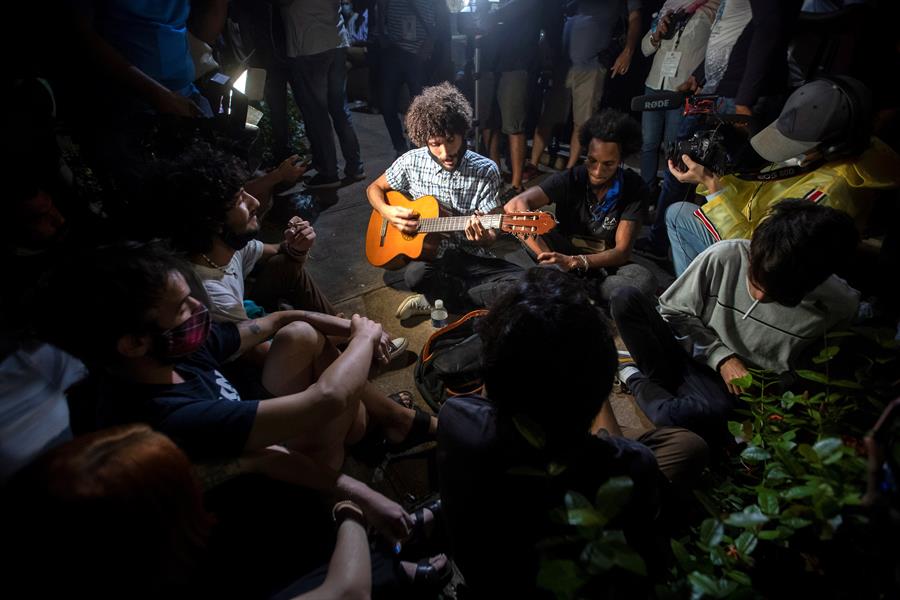
***
One phrase I heard more than once was “I couldn’t miss this.” This chronicle is not a space for in-depth political analysis of what happened. I already wrote briefly about this, and perhaps I will elaborate on it later. I refer here only to experience, which also matters.
In the almost seven hours that I spent there, what I saw was a Cuban microcosm. People of all kinds, friends, brothers and sisters, acquaintances, strangers, children of dear friends, themselves dear, different people; people who don’t greet each other, but know each other. The normal.
I didn’t see them split into groups: the revolutionaries on this side, the counterrevolutionaries on the other. That, it’s obvious, does not cancel the political belongings with which we arrived and left there, and with which we will continue.
What I’m saying is that we have a moral and political obligation to understand the Cuba of last night as something that in no way is “a gang of counterrevolutionaries making common cause with terrorists.” Whoever supports and encourages this narrative must know that they are guilty of proposing the most horrible future scenario ahead of us: the one that ensures the space of the “us” against all others. Everything in that phrase sounds horrible, because of the resulting consequences, and, above all, for the ones that could result later on.
It’s a nightmare I’ve had for a long time. I feel obligated to do everything I can to avoid it. I believe that we, as Cubans, have that duty. In this country, as in others, there are mercenaries. But in this place, there was not a single praise for U.S. interventionism in Cuba, nor a single defense of the blockade against Cuba. There were people I have read who defend them, but that has nothing to do with the general spirit I lived there.
This country, and the country last night, is not a country of mercenaries. What happened yesterday was the opposite. I lived fear and joy, I lived solidarity, I experienced concrete mutual help, I saw people talking normal in the midst of everything. Those are revolutionary values. When those who were in the meeting came out, and words were said that had never been said like that in public in a public place, I saw respect and I saw hope.
That hope is about Cuba, about the best future of which we are capable. The future we deserve. Anyone who wants to think that it is only about San Isidro, can do it, but they are wrong. Anyone who feels that he must defend “the revolution” against what happened yesterday, let him do so, but he is also wrong. The Revolution is not in a place, in a park, in a rally. It is wherever there is a moral conviction for justice and a political passion for freedom.
The Cuban authorities can and should understand what happened last night. Revolution is lucidity, said Alfredo Guevara, now it has to be so, perhaps as never before. We are risking a lot. External aggression will continue, legitimate internal demands will continue, and projects to co-opt the latter in favor of the former will continue.
Processing both effectively and legitimately requires a lot of wisdom and commitment. In Cuba there is that wisdom. The collective and patriotic Cuban wisdom.
As we left, those at the meeting assured us there were guarantees that we would all go home without retaliation. Maybe someone needed to hear that. I really didn’t. Personally, I entered, stayed, and left without any problem. I certainly was concerned about others close to me who were there, and I even told them to leave when it got darker. They didn’t leave and nothing happened to them. What I have described happened to others and then they sat down and integrated. I haven’t heard of anyone who experienced any problems leaving. It didn’t happen to anyone in the large group I was part of when I left.
In the end, we all sang La Bayamesa, the anthem of Perucho Figueredo and Isabel Vázquez, the anthem of all Cubans: the cry that in Bayamo announced the decision of an independent, free and just Cuba, on the ashes of their own homes.
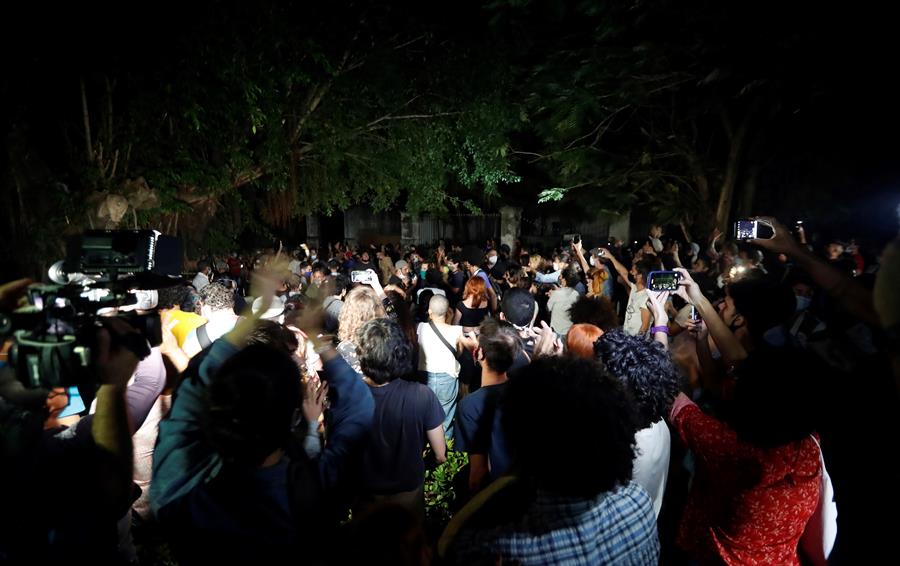
***
When I returned home, I bought bread, around three in the morning, at the 23 and 12 bakery. There was freshly baked bread, a sleepy woman, with a mask and a polyethylene bag correctly placed in her hands so as not to touch the bread. I said: “good evening, compañera.”
One of my teachers, Antoni Doménech Figueras, taught me that the etymological origin of “compañero” is “the one who shares the bread.” Its current use was already widespread among the European bakers’ guilds centuries ago. From there it went on to the political use of the “compañero” in the socialist tradition. I did not miss the opportunity to call the woman at the backery compañera. She replied politely: “good evening.”
I couldn’t sleep afterward until at least 5 am. A while later I got up to write these pages. Meanwhile, I’m listening to Santiago Feliú and I have asked one of my sons to go get the eggs at the grocers’. I feel calm. It’s been a long night.
Notes:
1 I asked Mario Castillo for permission to quote those phrases by him.
2 I asked Royma Cañas permission to quote those phrases by her.
*Editor´s note: This article was originally published by OnCuba on November 28, 2020.

